Unit 4 Body language language study and grammar
文档属性
| 名称 | Unit 4 Body language language study and grammar | 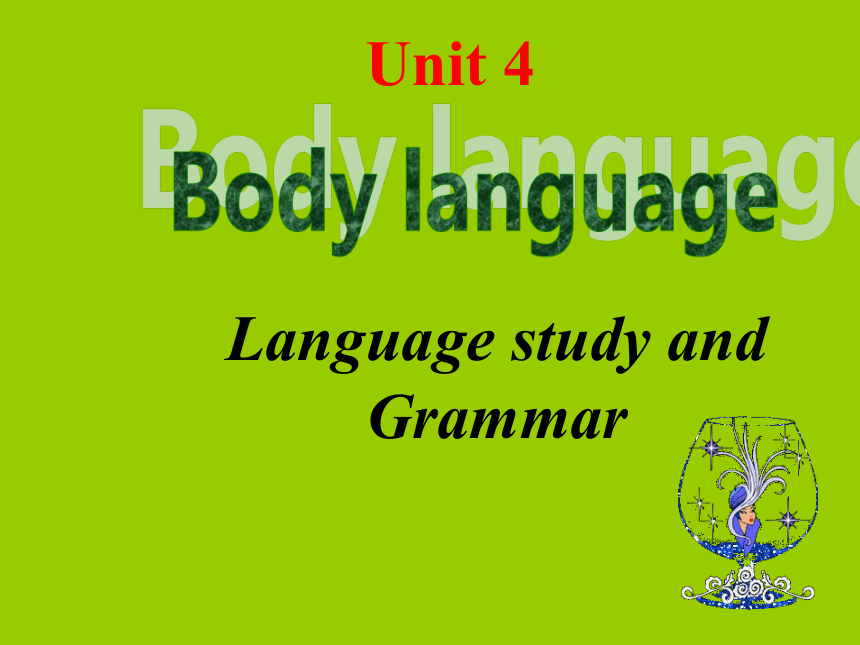 | |
| 格式 | rar | ||
| 文件大小 | 679.5KB | ||
| 资源类型 | 教案 | ||
| 版本资源 | 人教版(新课程标准) | ||
| 科目 | 英语 | ||
| 更新时间 | 2010-08-08 17:11:00 | ||
图片预览

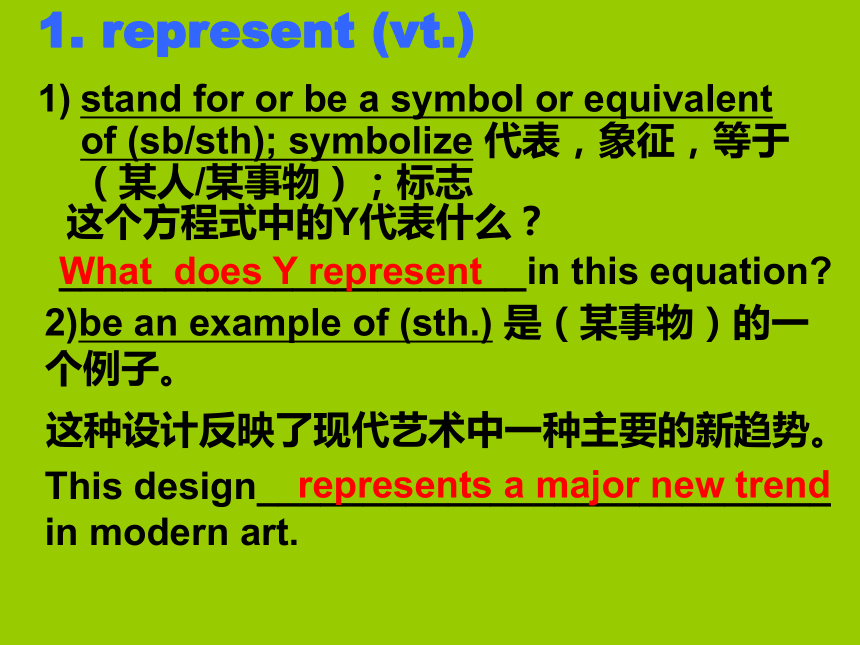
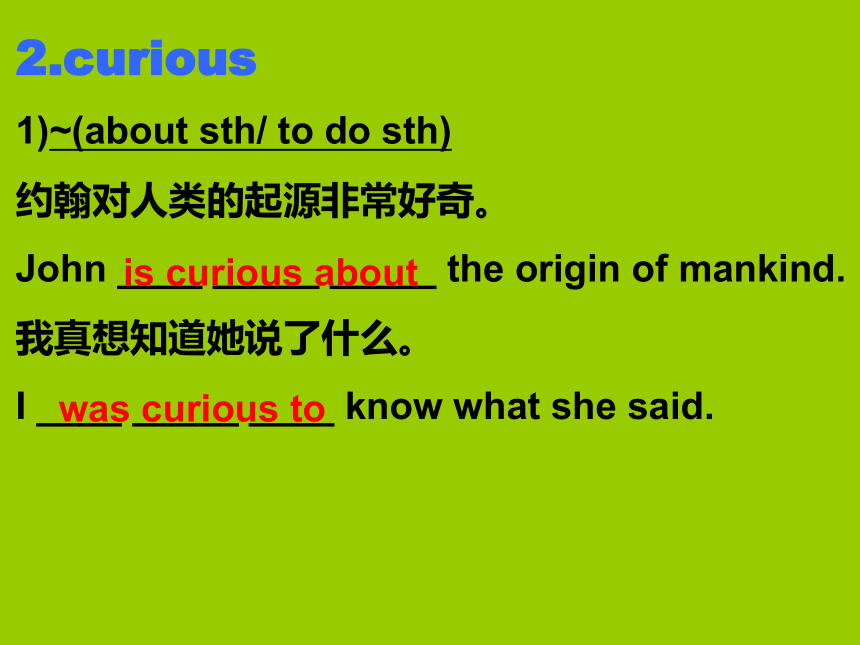

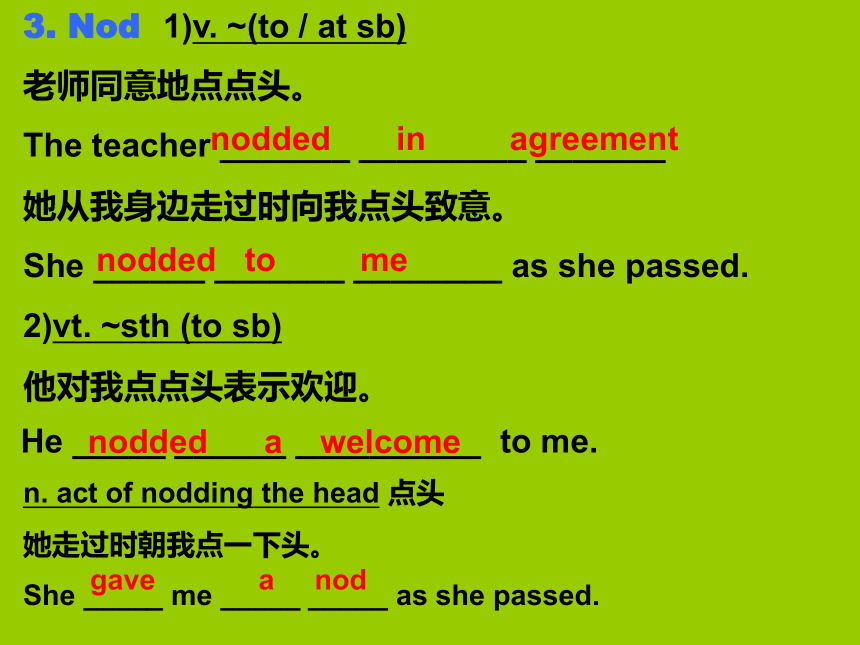
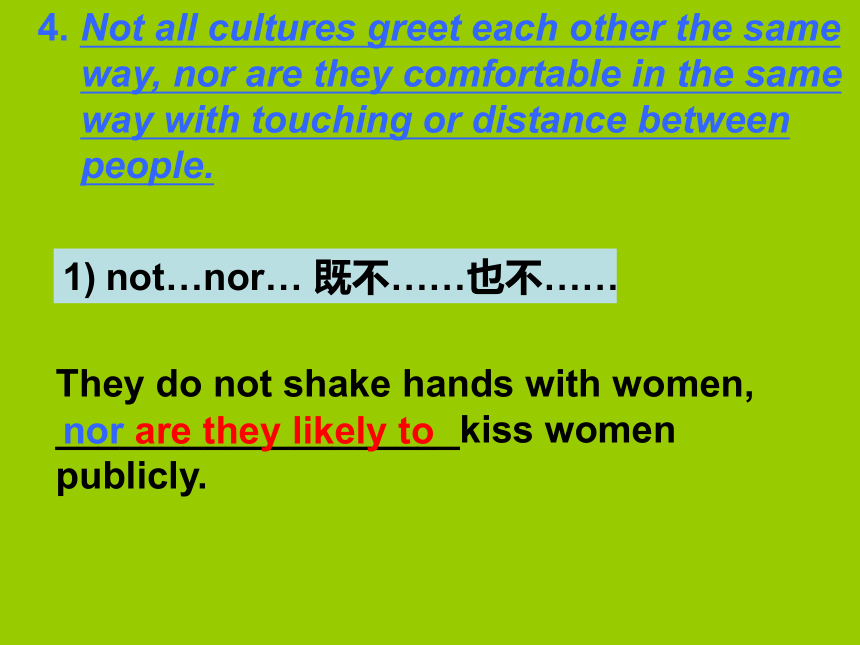
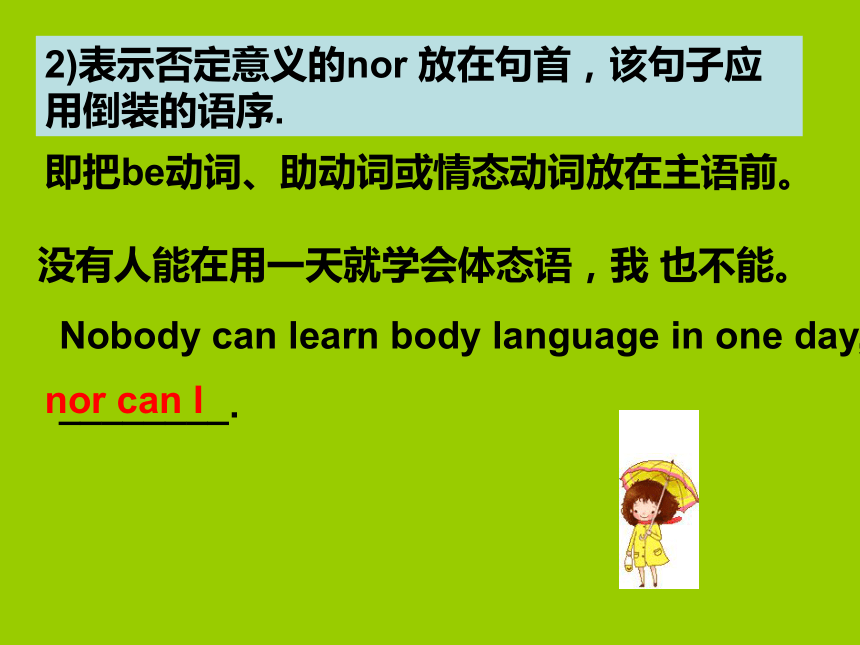
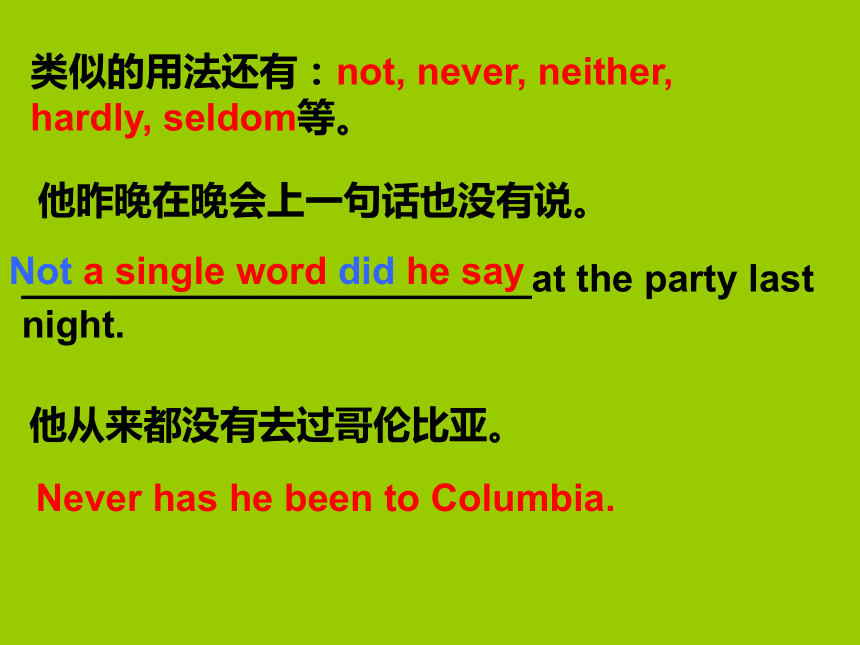
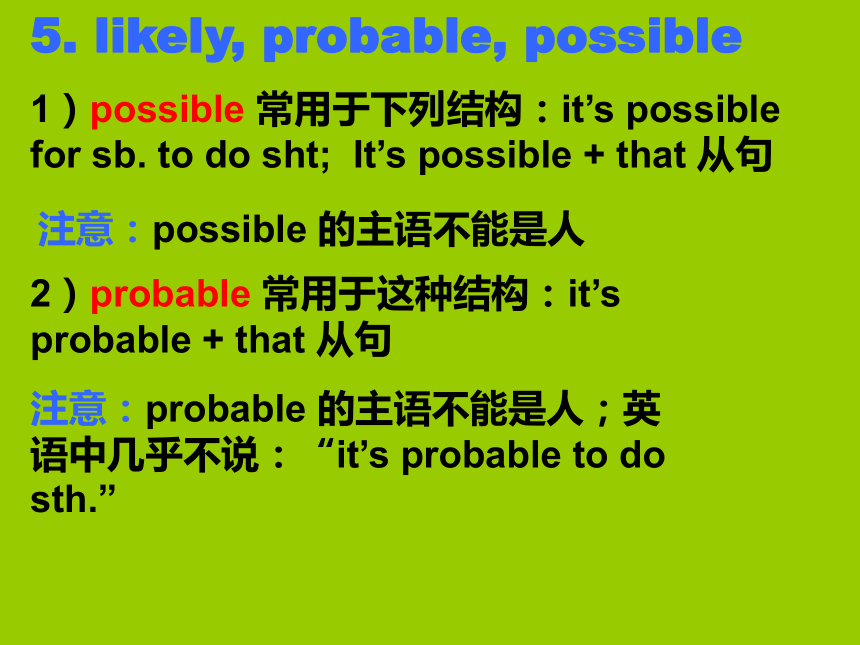
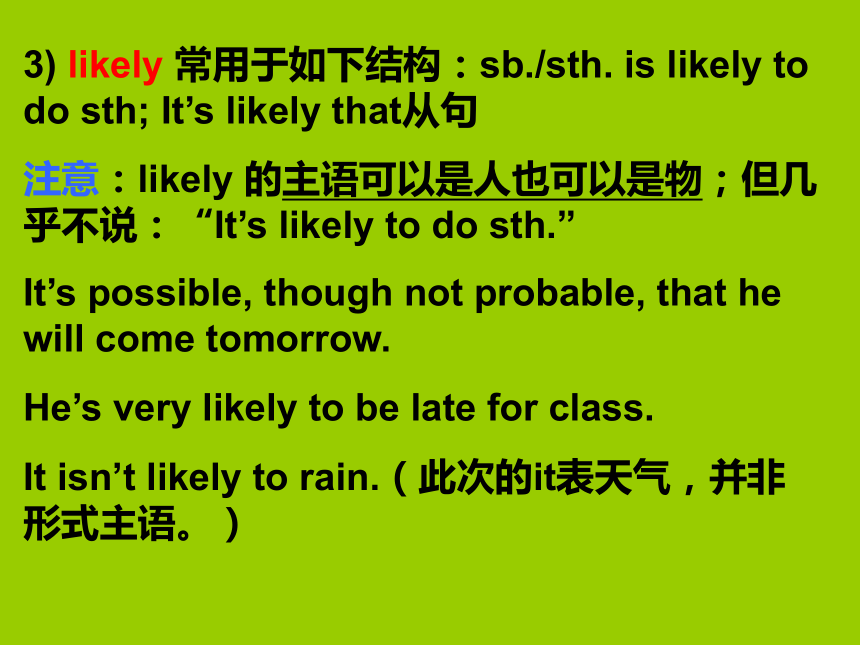
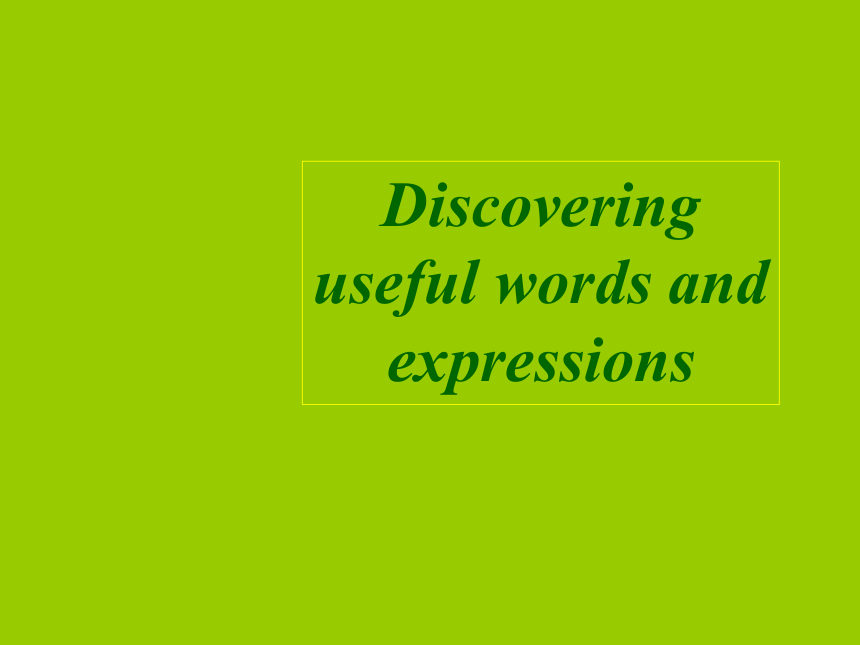
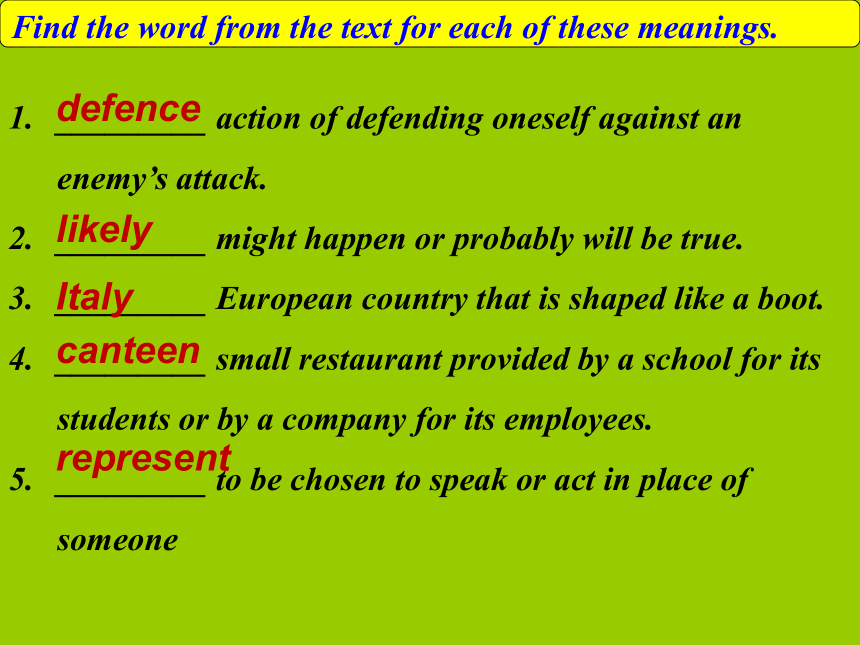
文档简介
课件51张PPT。Language study and GrammarUnit 4Body language1. represent (vt.)
stand for or be a symbol or equivalent of (sb/sth); symbolize 代表,象征,等于(某人/某事物);标志这个方程式中的Y代表什么?______________________in this equation?This design___________________________ in modern art.这种设计反映了现代艺术中一种主要的新趋势。2)be an example of (sth.) 是(某事物)的一个例子。What does Y representrepresents a major new trend2.curious
1)~(about sth/ to do sth)
约翰对人类的起源非常好奇。
John ____ _____ _____ the origin of mankind.
我真想知道她说了什么。
I ____ _____ ____ know what she said.is curious aboutwas curious toCuriously adv.她一整天都在那里,然而奇怪的是,我却没有看见她。She was there all day . But, curiously, I didn’t see her.curiosity n.3. Nod 1)v. ~(to / at sb)
老师同意地点点头。
The teacher _______ _________ _______
她从我身边走过时向我点头致意。
She ______ _______ ________ as she passed.
2)vt. ~sth (to sb)
他对我点点头表示欢迎。
nodded in agreementnodded to meHe _____ ______ __________ to me.nodded a welcomen. act of nodding the head 点头
她走过时朝我点一下头。
She _____ me _____ _____ as she passed.gave a nod 4. Not all cultures greet each other the same way, nor are they comfortable in the same way with touching or distance between people.They do not shake hands with women, ___________________kiss women publicly.not…nor… 既不……也不……nor are they likely to2)表示否定意义的nor 放在句首,该句子应用倒装的语序.即把be动词、助动词或情态动词放在主语前。Nobody can learn body language in one day,
________.没有人能在用一天就学会体态语,我 也不能。nor can I类似的用法还有:not, never, neither, hardly, seldom等。
Never has he been to Columbia.________________________at the party last night.他昨晚在晚会上一句话也没有说。Not a single word did he say他从来都没有去过哥伦比亚。5. likely, probable, possible
1)possible 常用于下列结构:it’s possible for sb. to do sht; It’s possible + that 从句
注意:possible 的主语不能是人2)probable 常用于这种结构:it’s probable + that 从句注意:probable 的主语不能是人;英语中几乎不说:“it’s probable to do sth.”3) likely 常用于如下结构:sb./sth. is likely to do sth; It’s likely that从句
注意:likely 的主语可以是人也可以是物;但几乎不说:“It’s likely to do sth.”
It’s possible, though not probable, that he will come tomorrow.
He’s very likely to be late for class.
It isn’t likely to rain.(此次的it表天气,并非形式主语。)Discovering useful words and expressions Find the word from the text for each of these meanings._________ action of defending oneself against an enemy’s attack.
_________ might happen or probably will be true.
_________ European country that is shaped like a boot.
_________ small restaurant provided by a school for its students or by a company for its employees.
_________ to be chosen to speak or act in place of someonedefencelikelyItalycanteenrepresentFind the word from the text for each of these meanings.6. _________ to run or travel somewhere in a great hurry
7 _____________ to come nearer to something or someone from a great distance
8 _______________ group of people organized for a special purpose
9 _________ either side of the face below the eye
10 _________ the act of flying, especially scheduled on a planedashapproachassociationcheekflightapproach cheek contrary curiously dash Jordan misunderstand Joan was sitting in the park. A tall, dark woman _________ her, singing loudly. She looked as if she was from a Middle Eastern country, maybe _______. After a minute, the woman stopped and started hitting her own _________. Joan watched _________, thinking that the woman seemed a little crazy. Suddenly, the woman saw Joan and ____________ over to her. Joan then realized that she had ________________ the woman’s actions – she wasn’t crazy. She was, on the _________, asking for help to kill a bee!approachedJordancheekcuriouslydashedComplete the passage with the words below in their proper forms.misunderstoodcontraryadult crossroads major greeted flight spoken dormitory association Colombia curious presentingJulia was at ________________. She had just graduated
from university and was ready to begin life as an
Independent ____________. She had already received some
great job offers from several ___________ companies and
was very excited about the opportunities. While cleaning out
her ____________ room on her last day at university, she
received an unexpected phone call. The caller _________ crossroadsadultmajordormitorygreetedUse the words from the box to complete the paragraph .her in careful English and then introduced himself as
____________ an international _____________. He had met
Julie a few weeks ago at a job fair and was impressed with
her ____________ English. The only difficulty was that his
company was in the country of ___________ . Julie was
_____________ to find out more, so after talking with her
parents that evening, she booked a _______________ to
South America.representingassociationspokenColombiacuriousflightDiscovering useful structures现在分词作定语,当分词单独做定语时,放在所修饰的名词前;如果是分词短语做定语放在名词后。
Eg.In the following years he worked even harder.
在后来的几年中,他学习更努力了。
The man speaking to the teacher is our monitor's father.
正与老师谈话的那个人是我们班长的父亲。
现在分词做定语现在分词作定语相当于一个定语从句的句法功能,如:in the following years也可用in the years that followed; the man speaking to the teacher可改为the man who is speaking to the teacher. Practice:
____ dogs seldom bite.
Bark B. To bark C. Barked D. Barking
(2) The wolf spoke in a _____ voice and Mr. Dongguo felt______.
frightening; frightened
B. frightened; frightened
C. frighten; frightening
D. frightening; frighteningDA(3) It’s pleasure to watch the face of a ____ baby.
asleep B. sleep C. sleeping D. slept
(4) The ____ buildings showed us that an earthquake was coming.
A. shaking B. shook C. shaken D. shake CA现在分词在语法功能上相当于动词、形容词和副词。现在分词通常和逻辑主语之间存在主动关系。但要注意它地各种形式变化:主动形式 被动形式
V-ing being V-ed
having V-ed having been V-ed 现在分词做状语一般式完成式E.g. Hearing the bell, the students began to enter the classroom. 听见铃声,学生们开始走进教室。(听见和进入两个动作同时发生)
The building being built now is our new library. 现在正在建造地 这栋楼房室我们地 新图书馆(being built为现在分词的被动形式,表示动作正在进行之中。)Having done the work, he went home. 完成了工作,他就回家了。现在分词作状语现在分词作状语往往和逻辑主语之间存在主动关系。现在分词作状语,常常用来表示原因、时间、方式、结果、条件、伴随状况等。现在分词一般不用作表目的地状语(通常用不定式表目的地状语)。
Walking in the street, I came across an old friend of mine.
(=When I was walking in the street, I came across an old friend of mine.)While waiting for the bus, he read a copy of China Daily.
(=While waiting for the bus,he read a copy of China Daily.)1)表时间状语2) 表原因状语
Being ill, he didn’t go to school.
(=as he was ill, he didn’t go to school.)Being a student, you should study hard.
(=Since you are a student, you should study hard.)既然你是一个学生,你就应该努力学习。由于想到它或许在家,所以我就给他打了电话。Thinking he might be at home, I called him.
(As I thought he might be at home, I called him.) 3)表方式、伴随情况地状语 :作伴随状语地分词表示的动作,必须是主语的一个 动作,或是与谓语所表示地动作(或状态)同时发生,或是对谓语表示地动词(或状态)作进一步地补充说明。Eg. He sat on the sofa, watching TV.
(=He sat on the sofa, and watched TV.)他们笑着谈着走进了教室。__________________ , they went into the classroom.他斜靠(lean)着墙站着。He stood leaning against the wall.(=He stood and leaned against the wall.)Laughing and talking4) 表结果
Eg. Her mother died in 1990, leaving her with her younger brother.
(=Her mother died in 1990, and left her with her younger brother.)全国到处在传唱这首歌曲,使它成了一首最受欢迎地歌曲。The song is sung all over the country,__________________________________.making it the most popular song5)表条件Using your head, you will find a way.
(=If you use your head, you will find a way.)一直往前走,你就会看到一座白色地房子。______________, you will see a white house.Walking ahead(6)与逻辑主语构成独立主格:
I waiting for the bus, a bird fell on my heard.
我等汽车时,一只鸟落到我头上。
All the tickets having been sold out, they went away disappointedly.
所有的票已经卖光了,他们失望地离开了。
Time permitting, we'll do another two exercises.
如果时间允许,我们将做另两个练习。
有时也可用with (without) +名词(代词宾格)+分词形式
With the lights burning, he fell asleep. 他点着灯睡着了。
(7)作独立成分:
Judging from(by) his appearance, he must be an actor.
从外表看,他一定是个演员。Practise:
They set out ____ for the ____ boy.
searching; losing B. searching; lost
C. to search; lost D. searched; losing
(2) The student sat there, ____ what to do.
doesn’t knowing B. didn’t knowing
C. not know D. not knowingBD(3)He sat there _____ , with his head on his hand.
and think B. thinking
C. thought D. being thought
(4) The ____ Prime Minister expressed his satisfaction with his talks, ___ that he had enjoyed his stay here.
visiting; add B. visited; adding
C. visiting; adding D. visited; addedBCThe secretary worked late into the night, _____a long speech for the president.(MET91)
To prepare B. preparing C. prepared D. was preparing
2.European foot ball is played in 80 countries, ______ it the most popular sport in the world.(NMET 98)
Making B. makes C. made D. to makeB现在分词表结果状语A 现在分词作伴随状语高考链接3. “Can’t you read?” Mary said _______ to the notice. (MET93)
A. angrily pointing B. and point angrily
C. angrily point D. and angrily pointingA现在分词作伴随状语4. ____ a reply, he decided to write again.(MET92)
Not receiving B. Receiving not C. Not having received D. Having not received
5.______ his telephone number, she had some difficulty getting in touch with Bill.(上海91年题)
Not knowing B. knowing not
C. Not having known D. Having not knownCA现在分词作原因状语,分词结构种否定词通常放在现在分词前面。作原因状语 1. Having not seen the film, I can’t tell you what I think of it.
2. The men worked for extra hours got an extra pay.
3. Seen from the top of the hill, we find the city more beautiful.
4. Generally speak, facial expressions are helpful communications, too.Not havingworkingSeeingspeaking单句改错5. “ Can’t you read?” the man said, angrily pointed to the notice on the wall.
6. Knocking at the door before entering, please.
7. European football is played in 80 countries, made it the most popular sport in the world.pointingKnockmaking 1. The stranger said something in a _______ voice and the little girl was very much ________
A. frightening, frightened
B. frightened, frightening
C. frightening, frightening
D. frightened, frightenedChoose the best answer. 2. ________the piano, someone suddenly knocked at the door.
A. Playing
B. When I was playing
C. Repairing
D. Examining 3. Mother caught the boy ______ in the corner.
A. smoke B. to smoke
C. being smoked D. smoking 4. ______ the programme, they have to stay there for another 2 weeks..
A. Not completing
B. Not completed
C. Not having completed
D. Having not completed5. “We can’t go out in this weather”, said Bob, ____ out of the window.
A. looking B. to look
C. looked D. having looked 6. Though _____ money, his parents managed to send him to university.
A. lacked B. lacking of
C. lacking D. lacked in 7. The bell _______ the end of the period rang, ______ our heated discussion.
A. indicating; interrupting
B. indicated; interrupting
C. indicating; interrupted
D. indicated; interrupted 8. _______ such heavy pollution already, it may now be too late to clean up the river.
A. Having suffered
B. Suffering
C. To suffer
D. Suffered 9. He looked around and caught a man ______ his hand into the pocket of a passenger.
A. put B. to be putting
C. to put D. putting 10. Suddenly, a tall man driving a golden carriage _____ the girl and took her away, ____ into the woods.
A. seizing; disappeared
B. seized; disappeared
C. seizing; disappearing
D. seized; disappearing 11. ______in the queue of half an hour. Tom suddenly realized that he had left his wallet at home.
A. To wait B. Have waited
C. Having waited D. To have waited 12. The picture _____ on the wall is painted by my nephew.
A. Having hung B. hanging
C. hangs D. being hung 13. Generally speaking, ______ according to the directions, the drug has no side effect.
A. when taking
B. when taken
C. when to take
D. when to be takenHomeworkFinish exercises on page 29.
Finish exercises on pages 63-64.
stand for or be a symbol or equivalent of (sb/sth); symbolize 代表,象征,等于(某人/某事物);标志这个方程式中的Y代表什么?______________________in this equation?This design___________________________ in modern art.这种设计反映了现代艺术中一种主要的新趋势。2)be an example of (sth.) 是(某事物)的一个例子。What does Y representrepresents a major new trend2.curious
1)~(about sth/ to do sth)
约翰对人类的起源非常好奇。
John ____ _____ _____ the origin of mankind.
我真想知道她说了什么。
I ____ _____ ____ know what she said.is curious aboutwas curious toCuriously adv.她一整天都在那里,然而奇怪的是,我却没有看见她。She was there all day . But, curiously, I didn’t see her.curiosity n.3. Nod 1)v. ~(to / at sb)
老师同意地点点头。
The teacher _______ _________ _______
她从我身边走过时向我点头致意。
She ______ _______ ________ as she passed.
2)vt. ~sth (to sb)
他对我点点头表示欢迎。
nodded in agreementnodded to meHe _____ ______ __________ to me.nodded a welcomen. act of nodding the head 点头
她走过时朝我点一下头。
She _____ me _____ _____ as she passed.gave a nod 4. Not all cultures greet each other the same way, nor are they comfortable in the same way with touching or distance between people.They do not shake hands with women, ___________________kiss women publicly.not…nor… 既不……也不……nor are they likely to2)表示否定意义的nor 放在句首,该句子应用倒装的语序.即把be动词、助动词或情态动词放在主语前。Nobody can learn body language in one day,
________.没有人能在用一天就学会体态语,我 也不能。nor can I类似的用法还有:not, never, neither, hardly, seldom等。
Never has he been to Columbia.________________________at the party last night.他昨晚在晚会上一句话也没有说。Not a single word did he say他从来都没有去过哥伦比亚。5. likely, probable, possible
1)possible 常用于下列结构:it’s possible for sb. to do sht; It’s possible + that 从句
注意:possible 的主语不能是人2)probable 常用于这种结构:it’s probable + that 从句注意:probable 的主语不能是人;英语中几乎不说:“it’s probable to do sth.”3) likely 常用于如下结构:sb./sth. is likely to do sth; It’s likely that从句
注意:likely 的主语可以是人也可以是物;但几乎不说:“It’s likely to do sth.”
It’s possible, though not probable, that he will come tomorrow.
He’s very likely to be late for class.
It isn’t likely to rain.(此次的it表天气,并非形式主语。)Discovering useful words and expressions Find the word from the text for each of these meanings._________ action of defending oneself against an enemy’s attack.
_________ might happen or probably will be true.
_________ European country that is shaped like a boot.
_________ small restaurant provided by a school for its students or by a company for its employees.
_________ to be chosen to speak or act in place of someonedefencelikelyItalycanteenrepresentFind the word from the text for each of these meanings.6. _________ to run or travel somewhere in a great hurry
7 _____________ to come nearer to something or someone from a great distance
8 _______________ group of people organized for a special purpose
9 _________ either side of the face below the eye
10 _________ the act of flying, especially scheduled on a planedashapproachassociationcheekflightapproach cheek contrary curiously dash Jordan misunderstand Joan was sitting in the park. A tall, dark woman _________ her, singing loudly. She looked as if she was from a Middle Eastern country, maybe _______. After a minute, the woman stopped and started hitting her own _________. Joan watched _________, thinking that the woman seemed a little crazy. Suddenly, the woman saw Joan and ____________ over to her. Joan then realized that she had ________________ the woman’s actions – she wasn’t crazy. She was, on the _________, asking for help to kill a bee!approachedJordancheekcuriouslydashedComplete the passage with the words below in their proper forms.misunderstoodcontraryadult crossroads major greeted flight spoken dormitory association Colombia curious presentingJulia was at ________________. She had just graduated
from university and was ready to begin life as an
Independent ____________. She had already received some
great job offers from several ___________ companies and
was very excited about the opportunities. While cleaning out
her ____________ room on her last day at university, she
received an unexpected phone call. The caller _________ crossroadsadultmajordormitorygreetedUse the words from the box to complete the paragraph .her in careful English and then introduced himself as
____________ an international _____________. He had met
Julie a few weeks ago at a job fair and was impressed with
her ____________ English. The only difficulty was that his
company was in the country of ___________ . Julie was
_____________ to find out more, so after talking with her
parents that evening, she booked a _______________ to
South America.representingassociationspokenColombiacuriousflightDiscovering useful structures现在分词作定语,当分词单独做定语时,放在所修饰的名词前;如果是分词短语做定语放在名词后。
Eg.In the following years he worked even harder.
在后来的几年中,他学习更努力了。
The man speaking to the teacher is our monitor's father.
正与老师谈话的那个人是我们班长的父亲。
现在分词做定语现在分词作定语相当于一个定语从句的句法功能,如:in the following years也可用in the years that followed; the man speaking to the teacher可改为the man who is speaking to the teacher. Practice:
____ dogs seldom bite.
Bark B. To bark C. Barked D. Barking
(2) The wolf spoke in a _____ voice and Mr. Dongguo felt______.
frightening; frightened
B. frightened; frightened
C. frighten; frightening
D. frightening; frighteningDA(3) It’s pleasure to watch the face of a ____ baby.
asleep B. sleep C. sleeping D. slept
(4) The ____ buildings showed us that an earthquake was coming.
A. shaking B. shook C. shaken D. shake CA现在分词在语法功能上相当于动词、形容词和副词。现在分词通常和逻辑主语之间存在主动关系。但要注意它地各种形式变化:主动形式 被动形式
V-ing being V-ed
having V-ed having been V-ed 现在分词做状语一般式完成式E.g. Hearing the bell, the students began to enter the classroom. 听见铃声,学生们开始走进教室。(听见和进入两个动作同时发生)
The building being built now is our new library. 现在正在建造地 这栋楼房室我们地 新图书馆(being built为现在分词的被动形式,表示动作正在进行之中。)Having done the work, he went home. 完成了工作,他就回家了。现在分词作状语现在分词作状语往往和逻辑主语之间存在主动关系。现在分词作状语,常常用来表示原因、时间、方式、结果、条件、伴随状况等。现在分词一般不用作表目的地状语(通常用不定式表目的地状语)。
Walking in the street, I came across an old friend of mine.
(=When I was walking in the street, I came across an old friend of mine.)While waiting for the bus, he read a copy of China Daily.
(=While waiting for the bus,he read a copy of China Daily.)1)表时间状语2) 表原因状语
Being ill, he didn’t go to school.
(=as he was ill, he didn’t go to school.)Being a student, you should study hard.
(=Since you are a student, you should study hard.)既然你是一个学生,你就应该努力学习。由于想到它或许在家,所以我就给他打了电话。Thinking he might be at home, I called him.
(As I thought he might be at home, I called him.) 3)表方式、伴随情况地状语 :作伴随状语地分词表示的动作,必须是主语的一个 动作,或是与谓语所表示地动作(或状态)同时发生,或是对谓语表示地动词(或状态)作进一步地补充说明。Eg. He sat on the sofa, watching TV.
(=He sat on the sofa, and watched TV.)他们笑着谈着走进了教室。__________________ , they went into the classroom.他斜靠(lean)着墙站着。He stood leaning against the wall.(=He stood and leaned against the wall.)Laughing and talking4) 表结果
Eg. Her mother died in 1990, leaving her with her younger brother.
(=Her mother died in 1990, and left her with her younger brother.)全国到处在传唱这首歌曲,使它成了一首最受欢迎地歌曲。The song is sung all over the country,__________________________________.making it the most popular song5)表条件Using your head, you will find a way.
(=If you use your head, you will find a way.)一直往前走,你就会看到一座白色地房子。______________, you will see a white house.Walking ahead(6)与逻辑主语构成独立主格:
I waiting for the bus, a bird fell on my heard.
我等汽车时,一只鸟落到我头上。
All the tickets having been sold out, they went away disappointedly.
所有的票已经卖光了,他们失望地离开了。
Time permitting, we'll do another two exercises.
如果时间允许,我们将做另两个练习。
有时也可用with (without) +名词(代词宾格)+分词形式
With the lights burning, he fell asleep. 他点着灯睡着了。
(7)作独立成分:
Judging from(by) his appearance, he must be an actor.
从外表看,他一定是个演员。Practise:
They set out ____ for the ____ boy.
searching; losing B. searching; lost
C. to search; lost D. searched; losing
(2) The student sat there, ____ what to do.
doesn’t knowing B. didn’t knowing
C. not know D. not knowingBD(3)He sat there _____ , with his head on his hand.
and think B. thinking
C. thought D. being thought
(4) The ____ Prime Minister expressed his satisfaction with his talks, ___ that he had enjoyed his stay here.
visiting; add B. visited; adding
C. visiting; adding D. visited; addedBCThe secretary worked late into the night, _____a long speech for the president.(MET91)
To prepare B. preparing C. prepared D. was preparing
2.European foot ball is played in 80 countries, ______ it the most popular sport in the world.(NMET 98)
Making B. makes C. made D. to makeB现在分词表结果状语A 现在分词作伴随状语高考链接3. “Can’t you read?” Mary said _______ to the notice. (MET93)
A. angrily pointing B. and point angrily
C. angrily point D. and angrily pointingA现在分词作伴随状语4. ____ a reply, he decided to write again.(MET92)
Not receiving B. Receiving not C. Not having received D. Having not received
5.______ his telephone number, she had some difficulty getting in touch with Bill.(上海91年题)
Not knowing B. knowing not
C. Not having known D. Having not knownCA现在分词作原因状语,分词结构种否定词通常放在现在分词前面。作原因状语 1. Having not seen the film, I can’t tell you what I think of it.
2. The men worked for extra hours got an extra pay.
3. Seen from the top of the hill, we find the city more beautiful.
4. Generally speak, facial expressions are helpful communications, too.Not havingworkingSeeingspeaking单句改错5. “ Can’t you read?” the man said, angrily pointed to the notice on the wall.
6. Knocking at the door before entering, please.
7. European football is played in 80 countries, made it the most popular sport in the world.pointingKnockmaking 1. The stranger said something in a _______ voice and the little girl was very much ________
A. frightening, frightened
B. frightened, frightening
C. frightening, frightening
D. frightened, frightenedChoose the best answer. 2. ________the piano, someone suddenly knocked at the door.
A. Playing
B. When I was playing
C. Repairing
D. Examining 3. Mother caught the boy ______ in the corner.
A. smoke B. to smoke
C. being smoked D. smoking 4. ______ the programme, they have to stay there for another 2 weeks..
A. Not completing
B. Not completed
C. Not having completed
D. Having not completed5. “We can’t go out in this weather”, said Bob, ____ out of the window.
A. looking B. to look
C. looked D. having looked 6. Though _____ money, his parents managed to send him to university.
A. lacked B. lacking of
C. lacking D. lacked in 7. The bell _______ the end of the period rang, ______ our heated discussion.
A. indicating; interrupting
B. indicated; interrupting
C. indicating; interrupted
D. indicated; interrupted 8. _______ such heavy pollution already, it may now be too late to clean up the river.
A. Having suffered
B. Suffering
C. To suffer
D. Suffered 9. He looked around and caught a man ______ his hand into the pocket of a passenger.
A. put B. to be putting
C. to put D. putting 10. Suddenly, a tall man driving a golden carriage _____ the girl and took her away, ____ into the woods.
A. seizing; disappeared
B. seized; disappeared
C. seizing; disappearing
D. seized; disappearing 11. ______in the queue of half an hour. Tom suddenly realized that he had left his wallet at home.
A. To wait B. Have waited
C. Having waited D. To have waited 12. The picture _____ on the wall is painted by my nephew.
A. Having hung B. hanging
C. hangs D. being hung 13. Generally speaking, ______ according to the directions, the drug has no side effect.
A. when taking
B. when taken
C. when to take
D. when to be takenHomeworkFinish exercises on page 29.
Finish exercises on pages 63-64.
同课章节目录
